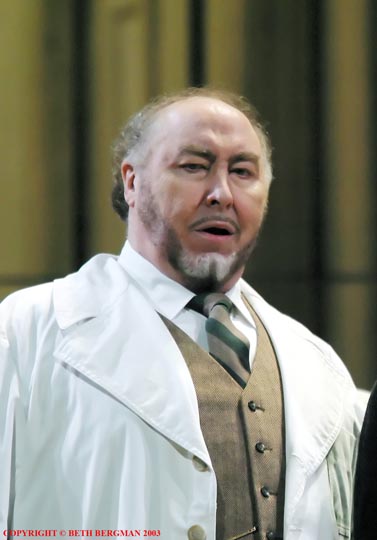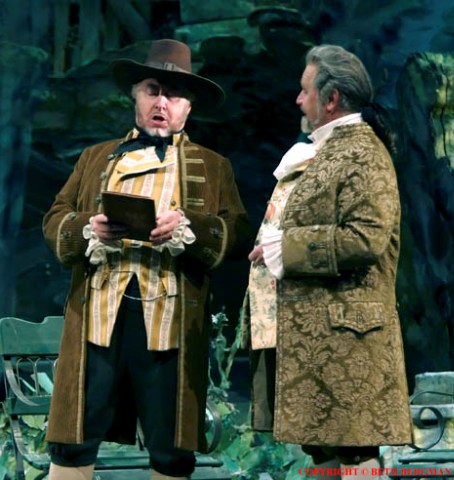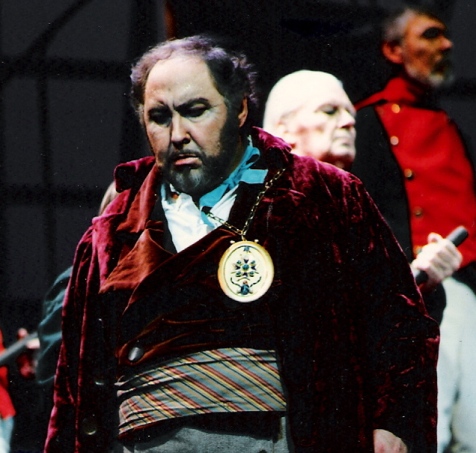Click on title or logo to order the following titles.
The Abduction Of Figaro
 The
Abduction Of Figaro (Video Arts International DVD 4251): A simply grand
opera in three acts and by far the largest work by P.D.Q. Bach so far
discovered, in the premiere performances by the Minnesota Opera, April
27 and 28, 1984, at the Orpheum Theatre in Minneapolis, Minnesota. This
DVD features bonus selections containing excerpts from Gross Concerto
and an interview from “Hourglass” originally telecast November 8, 1972
in Vancouver. This selection was originally available on videotape and
is now available on a Region 0 (playable in all regions) DVD.
The
Abduction Of Figaro (Video Arts International DVD 4251): A simply grand
opera in three acts and by far the largest work by P.D.Q. Bach so far
discovered, in the premiere performances by the Minnesota Opera, April
27 and 28, 1984, at the Orpheum Theatre in Minneapolis, Minnesota. This
DVD features bonus selections containing excerpts from Gross Concerto
and an interview from “Hourglass” originally telecast November 8, 1972
in Vancouver. This selection was originally available on videotape and
is now available on a Region 0 (playable in all regions) DVD.
The Tender Land
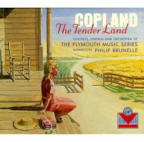 Aaron
Copland didn't have the theatrical instinct of a George Gershwin or even
a Gian Carlo Menotti, but that didn't keep him from writing one of the
best operas we have in the "American" vein. The Tender Land was composed
in 1953 on a commission from Richard Rodgers and Oscar Hammerstein
II--who since the premiere of Oklahoma! 10 years earlier could afford
such largesse--and received its premiere on April 1, 1954 at the City
Center in New York. Concerning a girl transformed into a young woman by
her first experience of love, The Tender Land is set in the American
Midwest during the 1930s. The libretto by Horace Everett (a pseudonym of
Erik Johns) was inspired by photographs taken by Walker Evans of a
rural, Depression-era mother and her daughter that had appeared in James
Agee's book Let Us Now Praise Famous Men. The music is cut from the same
cloth as that of Appalachian Spring--the melodic, easygoing, folkish
vein that Copland could manage about as easily as breathing. Lightly
scored (calling for winds and brass in twos) and with spoken dialogue in
the style of the musical stage, the score has come to be regarded as one
of Copland's finest, as he himself believed it to be. You couldn't get a
more authentic cast than the one heard here, consisting entirely of good
American singers whose delivery is appropriately nonoperatic, and
including Minnesota native Elisabeth Comeaux in the central role of
Laurie. Philip Brunelle leads the forces of the Minnesota-based Plymouth
Music Series in an idiomatic if slightly underpowered performance that
comes from the Heartland and goes straight to the heart. --Ted Libbey
Aaron
Copland didn't have the theatrical instinct of a George Gershwin or even
a Gian Carlo Menotti, but that didn't keep him from writing one of the
best operas we have in the "American" vein. The Tender Land was composed
in 1953 on a commission from Richard Rodgers and Oscar Hammerstein
II--who since the premiere of Oklahoma! 10 years earlier could afford
such largesse--and received its premiere on April 1, 1954 at the City
Center in New York. Concerning a girl transformed into a young woman by
her first experience of love, The Tender Land is set in the American
Midwest during the 1930s. The libretto by Horace Everett (a pseudonym of
Erik Johns) was inspired by photographs taken by Walker Evans of a
rural, Depression-era mother and her daughter that had appeared in James
Agee's book Let Us Now Praise Famous Men. The music is cut from the same
cloth as that of Appalachian Spring--the melodic, easygoing, folkish
vein that Copland could manage about as easily as breathing. Lightly
scored (calling for winds and brass in twos) and with spoken dialogue in
the style of the musical stage, the score has come to be regarded as one
of Copland's finest, as he himself believed it to be. You couldn't get a
more authentic cast than the one heard here, consisting entirely of good
American singers whose delivery is appropriately nonoperatic, and
including Minnesota native Elisabeth Comeaux in the central role of
Laurie. Philip Brunelle leads the forces of the Minnesota-based Plymouth
Music Series in an idiomatic if slightly underpowered performance that
comes from the Heartland and goes straight to the heart. --Ted Libbey
Die Meistersinger von Nurnberg
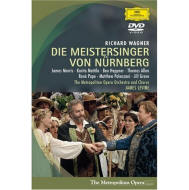 Metropolitan
Opera (2001); Wagner - Die Meistersinger von Nurnberg / Heppner, Mattila,
Morris, Pape, Allen, Polenzani, Levine. Meistersinger is the
quintessential Wagner - Controversial/German/Dynamic. An experience of
the Romantic in music and drama, again the Met does not disappoint with
this latest entry in home DVD. Gorgeous traditional staging (recreating
16th century Nurnberg exquisitely), a solid cast, one of the finest
orchestras, and quality packaging. The sets, color, costuming and
overall staging is perhaps the finest I've seen - you WILL be taken to
16th century Nurnberg. The final scene of Act 3 is spectacular - a
Medieval German feast for the eyes - with Wagners magnficient music. The
acting is superb with the characters all very human, and is coupled very
well with strong voice performance from all the cast - no weak links
here.
Metropolitan
Opera (2001); Wagner - Die Meistersinger von Nurnberg / Heppner, Mattila,
Morris, Pape, Allen, Polenzani, Levine. Meistersinger is the
quintessential Wagner - Controversial/German/Dynamic. An experience of
the Romantic in music and drama, again the Met does not disappoint with
this latest entry in home DVD. Gorgeous traditional staging (recreating
16th century Nurnberg exquisitely), a solid cast, one of the finest
orchestras, and quality packaging. The sets, color, costuming and
overall staging is perhaps the finest I've seen - you WILL be taken to
16th century Nurnberg. The final scene of Act 3 is spectacular - a
Medieval German feast for the eyes - with Wagners magnficient music. The
acting is superb with the characters all very human, and is coupled very
well with strong voice performance from all the cast - no weak links
here.
Patience and Sarah
 Mr.
Lehr is Pa on the 1998 Lincoln Center Festival premiere Legato Classics
recording of
Patience
and Sarah
by Paula Kimper and Wende Persons. Patience and Sarah is an opera
based on the 1969 historical fiction lesbian novel by Alma Routsong,
using the pen name Isabel Miller. It was originally self-published under
the title A Place For Us and eventually found a publisher as
Patience and Sarah in 1971. It is fiction based on a real-life
painter named Mary Ann Willson who lived with her companion Miss
Brundage as a "farmerette" in the early 19th century in Greene County,
New York. It tells the story of two women in Connecticut in 1816 who
fall in love and decide to leave their homes to buy a farm in another
state or territory and live in a Boston marriage. The story addresses
the limited opportunities and roles of women in early America, gender
expression, and the interpretation of religion in everyday life.
Mr.
Lehr is Pa on the 1998 Lincoln Center Festival premiere Legato Classics
recording of
Patience
and Sarah
by Paula Kimper and Wende Persons. Patience and Sarah is an opera
based on the 1969 historical fiction lesbian novel by Alma Routsong,
using the pen name Isabel Miller. It was originally self-published under
the title A Place For Us and eventually found a publisher as
Patience and Sarah in 1971. It is fiction based on a real-life
painter named Mary Ann Willson who lived with her companion Miss
Brundage as a "farmerette" in the early 19th century in Greene County,
New York. It tells the story of two women in Connecticut in 1816 who
fall in love and decide to leave their homes to buy a farm in another
state or territory and live in a Boston marriage. The story addresses
the limited opportunities and roles of women in early America, gender
expression, and the interpretation of religion in everyday life.
Jonah and the Whale
 Plymouth Music Series PMS-001 stereo
Plymouth Music Series PMS-001 stereo
ARGENTO Jonah and the Whale - Walker, narr. Wilcox, sop. Sutton, ten.
Brandstetter, bar. Lehr, b. Brunelle, cond. Ricketts, Lund and
Bonecutter, tb. Holmquist, Olsen and Portnoi, perc. Aspnes, hp. Ryan, p.
Samll, org. (17th listing on the page). "The majority of the
libretto is taken from a fourteenth-century poem, Patience . Other texts
include the King James Bible, Kyrie Eleison, the De Profundis, the hymn,
"Praise to the Lord," a sea shanty, "Greenland Fishery," and original
verse by Argento. Diverse in its anachronistic juxtaposition of texts
and musical settings, the oratorio is bound together by structural
elements and a tone row, which is pervasive, but not employed
exclusively. Another unifying device in Jonah is the symbolism of
"threes," inspired by a trefoil pattern in a Swedish painting depicting
Jonah. The tone row is based on ascending and descending diminished
triads. The orchestra is a trio of trios: three trombones, three
percussionists, and three keyboards. "Praise to the Lord" is written in
3/4, with three flats, and six-bar phrases. Jonah and the Whale is
exceptional in its genre, not only in its variety of composition and
texts, but in its powerful communication of Jonah's story through both
music and verse."
(The above
information was written by Lisa Hanson. Click here for a link to the
source.)
Other Recordings
Other recordings on which LeRoy Lehr is featured include Stephen Paulus’ So Hallow’d is the Time, Gerald Finzi’s In Terra Pax and Rutter Christmas Carols on the Pro Arte label. He also appears on the televised Broadcasts from the Metropolitan Opera of The Queen of Spades.


